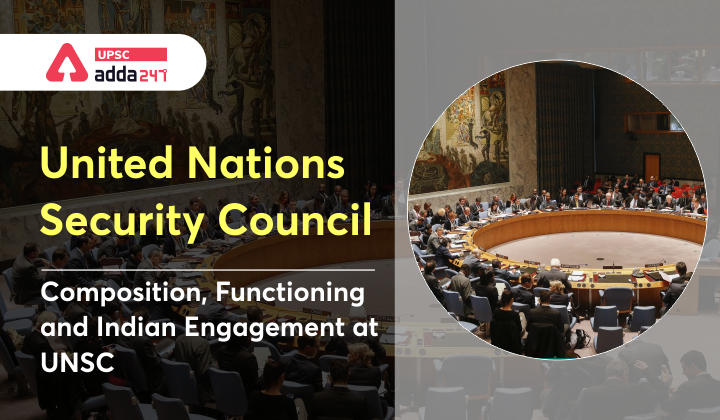Table of Contents
Relevance
- GS Paper 2: International Relations- Important International institutions, agencies and fora- their structure, mandate.
Context
- Recently, India has begun its one-month-long presidency of the United Nations Security Council (UNSC). It has set three priorities for the month-maritime security, counterterrorism, and peacekeeping.
- India began its two-year tenure as a non-permanent member of the Security Council began on January 1, 2021. Along with India, Ireland, Mexico and Norway were also elected to the council.
- This is the 8rth time that India has been elected to UNSC as a non-permanent member. Previously, it has been elected for the period of 1950-1951, 1967-1968, 1972-1973, 1977-1978, 1984-1985, 1991-1992, and 2011-2012.
About UNSC
- UNSC is one of the six main organs of the UN. Article 23 of the UN Charter concerns the composition of the UNSC.
- The other 5 organs of the United Nations are—the General Assembly, the Trusteeship Council, the Economic and Social Council, the International Court of Justice, and the Secretariat.
- It’s primarily responsible for maintaining international peace and security. Under UN Charter, it’s obligatory for the member states to implement decisions of the UNSC.
- Main headquarter: New York City at the UN Headquarters.
- Composition: It is composed of 15 members- 5 permanent and 10 non-permanent.
- Permanent members: China, France, the Russian Federation, the United Kingdom, and the United States.
- Non-permanent members: Each year, the General Assembly elects five non-permanent members out of a total of 10, for a two-year term.
- Process of the election of non-permanent members:
- Regional distribution of seats: Five for African and Asian countries; two for Latin American and Caribbean countries; two for Western European and other countries; one for Eastern European countries.
- Out of five, three are allocated for Africa and two for Asia.
- A contesting country needs to secure the votes of two-thirds of the members present and voting at the General Assembly session (a minimum of 129 votes if all 193 member states participate).
- A contesting country has to obtain this irrespective of whether it has been endorsed unanimously by its group or not.
- For example, India’s candidature for the 2021-22 term was endorsed unanimously by the Asia Pacific group. Still, India had to secure a minimum number of votes in the General Assembly session. It garnered 184 votes in the General Assembly.
- Regional distribution of seats: Five for African and Asian countries; two for Latin American and Caribbean countries; two for Western European and other countries; one for Eastern European countries.
- Decision-making at UNSC: Each member has one vote. For any resolution to pass, 9 members out of 15 should vote in favour including the concurring votes of the permanent members.
- The veto power of Permanent members: A “No” vote from one of the five permanent members blocks the passage of the resolution.
- A non-member of the security council can participate in UNSC discussions but without a vote, if it is discussing a matter which directly affects the interests of the concerned country.
- UNSC Presidency: rotates every month among its 15 members.
- Enforcement of UNSC decisions: they are typically enforced by UN peacekeepers, military forces voluntarily provided by member states, and funded independently of the main UN budget.
India at UNSC
- India at the beginning of its 8rth term as a non-permanent member, has said that it is committed to promoting international peace and security by its 5-S approach:
- Samman – Respect
- Samvad – Dialogue
- Sahyog – Cooperation
- Shanti – Peace
- Samriddhi – Prosperity
- Key contributions by India during previous tenures:
- 1950-51: presided over the adoption of resolutions calling for the cessation of hostilities during the Korean War and for assistance to the Republic of Korea.
- 1967-68: co-sponsored Resolution 238 extending the mandate of the UN mission in Cyprus.
- 1972-73: pushed strongly for admission of Bangladesh into the UN.
- 1977-78: India was a strong voice for Africa in the UNSC and spoke against apartheid and for Namibia’s independence in 1978.
- 1984-85: India was a leading voice in UNSC for resolution of conflicts in the Middle East, especially Palestine and Lebanon.
- 1991-92: Participated in the first-ever summit-level meeting of the UNSC and spoke on its role in the maintenance of peace and security.
- 2011-2012: India was a strong voice for developing world, peacekeeping, counter-terrorism, and Africa. The first statement on Syria was during India’s Presidency at the UNSC. During this tenure, India chaired the following important committees–
- UNSC 1373 Committee concerning Counter-Terrorism,
- 566 Working Group concerning threat to international peace and security by terrorist acts, and
- Security Council 751/1907 Committee concerning Somalia and Eritrea.
- Countering terrorism: India piloted a draft Comprehensive Convention on International Terrorism (CCIT) in 1996 with the objective of providing a comprehensive legal framework to combat terrorism.
- With effective coordination with like-minded partners in UNSC, India has ensured the listing of Pakistan-based terrorist Masood Azhar under the UNSC’s 1267 Sanctions Committee (May 2019) concerning al-Qaeda and ISIS and associated individuals and entities, which was pending since 2009.
- India also worked for enhancing international cooperation in counter-terrorism, prevention of the proliferation of weapons of mass destruction to non-state actors, and the strengthening of UN peacekeeping and peacebuilding efforts.
During its presidency of UNSC, India aims to ensure that its efforts are directed towards realizing the objectives of international peace and security through strengthening the UN Peacekeeping forces, ensuring maritime security, and formulating and implanting effective counter-terrorism strategies.



 TSPSC Group 1 Question Paper 2024, Downl...
TSPSC Group 1 Question Paper 2024, Downl...
 TSPSC Group 1 Answer key 2024 Out, Downl...
TSPSC Group 1 Answer key 2024 Out, Downl...
 UPSC Prelims 2024 Question Paper, Downlo...
UPSC Prelims 2024 Question Paper, Downlo...




